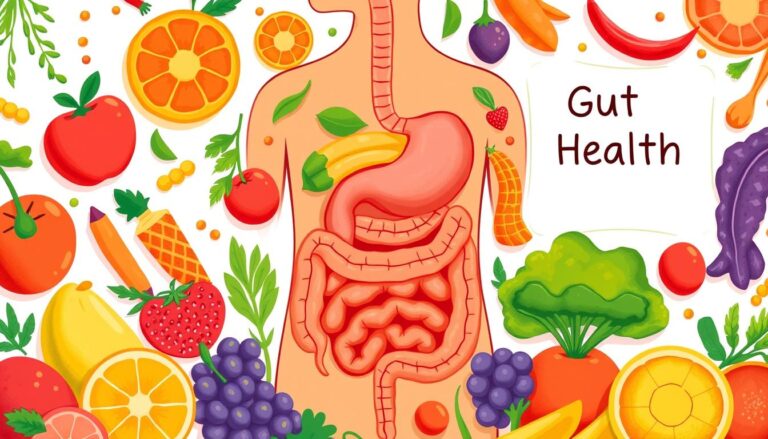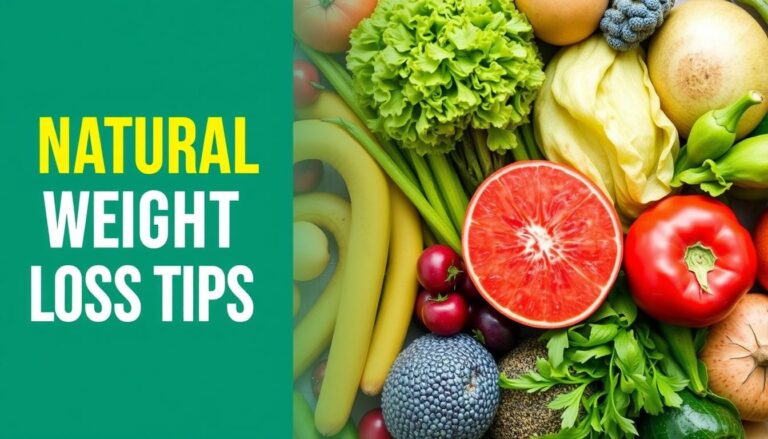What if the key to a healthier lifestyle lies in the foods we often try to avoid, such as healthy fats? For years we’ve been led to believe that all fats are bad.
But the truth is good fats are essential for our bodies. They provide energy, absorb vitamins, and protect our heart and brain health.
The benefits of healthy fats are numerous, and it’s time to separate fact from fiction.
Key Takeaways
- Healthy fats are crucial for maintaining a healthy lifestyle, reducing the risk of heart disease and supporting brain function.
- Unsaturated fats, including polyunsaturated and monounsaturated fats, can decrease bad cholesterol and increase good cholesterol.
- Saturated fats, when consumed in moderation, can also have benefits, such as increasing HDL cholesterol and lowering the risk of cardiovascular diseases.
- Including healthy fats in your diet can help with blood sugar control, reduce inflammation, and improve blood cholesterol levels.
- Good sources of healthy fats include nuts, avocados, olive oil, and fatty fish, which are rich in omega-3 and omega-6 fatty acids.
- The American Heart Association recommends consuming at least two servings of fish per week to reach approximately 1 gram of omega-3 fatty acids per day.
- Limited intake of saturated fats, around 10% of daily calories, is recommended to maintain a balanced diet.
As we delve into the world of healthy fats, we’ll explore the benefits of healthy fats, their sources, and importance in our diet. We aim to provide you with the ultimate guide to making informed choices about the fats you include in your meals.
Understanding the Role of Fats in Your Body
Fats are a key nutrient in our bodies. They give us energy, help us absorb vitamins, and protect our heart and brain. There are four main types of dietary fats: saturated, trans, monounsaturated, and polyunsaturated. Eating too much saturated and trans fats can harm our heart health.
The essential functions of fats include energy, vitamin absorption, and healthy skin and hair. Processing fats differently is vital. For instance, monounsaturated and polyunsaturated fats are better for us than saturated and trans fats.
Essential Functions of Dietary Fats
Dietary fats are crucial for our bodies. They give us energy, help absorb vitamins, and keep our skin and hair healthy. Fats have more calories than carbs and proteins, with 9 calories per gram.
How Your Body Processes Different Fats
Our bodies handle fats in various ways. Monounsaturated and polyunsaturated fats are healthier than saturated and trans fats. Eating too much of the latter can lead to heart disease. But, the former can improve our cholesterol levels.

Why We Need Fats in Our Diet
Fats are necessary for energy, vitamin absorption, and skin and hair health. A balanced diet with different foods provides all the needed fats. It’s important to choose healthier fats like plant oils and limit saturated and trans fats.
| Type of Fat | Example | Effect on Health |
|---|---|---|
| Saturated Fats | Butter, Cheese | Raise bad cholesterol LDL levels |
| Trans Fats | Hydrogenated Vegetable Oil | Raise bad cholesterol LDL levels and lower good cholesterol HDL levels |
| Monounsaturated Fats | Olive Oil, Avocado | Lower bad cholesterol LDL levels and increase good cholesterol HDL levels |
| Polyunsaturated Fats | Fatty Fish, Nuts | Lower bad cholesterol LDL levels and increase good cholesterol HDL levels |
The Ultimate Guide to Healthy Fats Benefits and Best Sources
Healthy fats are key for our bodies. They help lower heart disease risk and improve blood cholesterol. Foods like avocados, nuts, seeds, olive oil, and fatty fish are great sources. They’re full of fats that are good for our hearts.
These fats, like monounsaturated and polyunsaturated, are good. They help lower bad cholesterol and triglycerides. They also boost good cholesterol.
Healthy fats do more than just help our hearts. They also reduce inflammation and improve brain function. Foods rich in omega-3s, like salmon and walnuts, are especially good. They can lower triglycerides and heart disease risk.
But, trans fats are bad. They’re found in some oils and are not good for our cholesterol. Luckily, they’re banned in U.S. food now.
Here are some top sources of healthy fats:
- Avocados
- Nuts and seeds, such as almonds and pumpkin seeds
- Olive oil
- Fatty fish, such as salmon and sardines
Eating these foods can greatly benefit our health. They can lower heart disease risk and boost brain function. Choosing healthy fats is a big step towards a better life.
Breaking Down the Different Types of Dietary Fats
Dietary fats are key to a healthy diet. Knowing the different types helps us make better choices. There are saturated fats, unsaturated fats, and trans fats, each affecting our body in unique ways.
The American Heart Association suggests limiting saturated fats to 5% to 6% of daily calories. High amounts can raise heart disease risk. In contrast, unsaturated fats, like omega-3s, are good for the heart and lower disease risk.
Saturated vs. Unsaturated Fats
Saturated fats are solid at room temperature, found in meat and dairy. Unsaturated fats, like those in nuts and fish, are liquid. While too much saturated fat is bad, unsaturated fats are vital for our health.
Understanding Trans Fats
Trans fats are made during food processing and are in fried foods and baked goods. We should limit trans fats to less than 1% of daily calories. They can increase heart disease risk.
The Power of Omega-3s 6s and 9s
Omega-3s, 6s, and 9s are essential fats. Omega-3s, found in fish and flaxseeds, lower heart disease risk. It’s important to balance these fats as too much omega-6 can cause health issues.
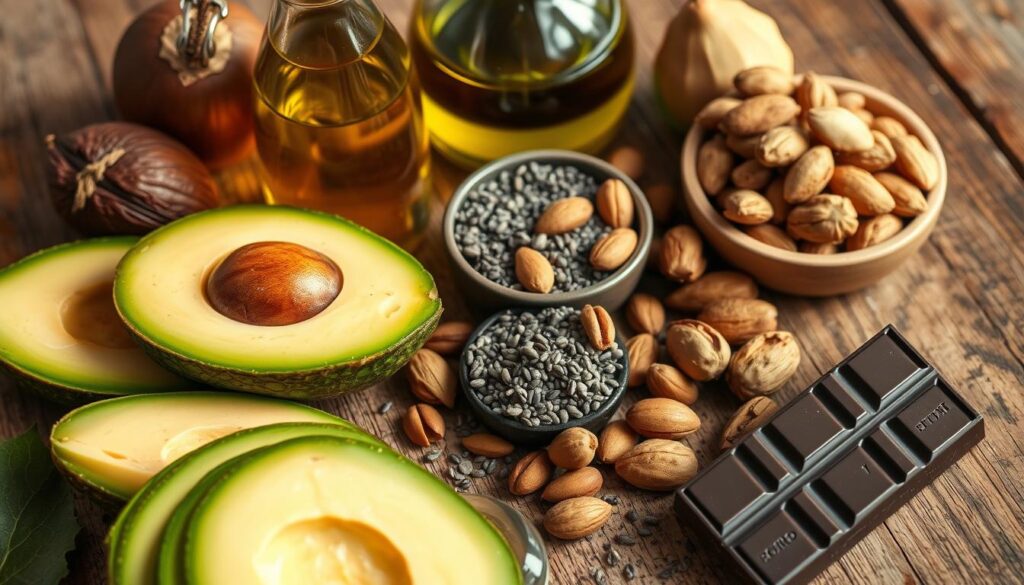
Healthy fats include avocado oil and olive oil. Avocado oil has 13.4% omega-6, while olive oil has up to 27%. But these fats can become harmful when heated. So, choose the right fat for cooking and eat them in moderation.
Top Sources of Heart Healthy Fats
Heart-healthy fats are key for a healthy heart and overall health. You can find them in avocados, nuts, seeds, and olive oil. Avocados, for instance, are full of monounsaturated fats. These fats can lower cholesterol and cut down heart disease risk.
Here are some top sources of heart-healthy fats:
- Avocados: rich in monounsaturated fats and a good source of fiber and potassium
- Nuts: high in healthy fats and fiber, and a good source of protein and antioxidants
- Seeds: rich in heart-healthy omega-3 fatty acids and a good source of fiber and protein
- Olive oil: a significant source of heart-healthy monounsaturated fat and a good source of antioxidants

Eating these heart-healthy fats can bring many benefits. They can lower heart disease risk improve cholesterol, and help with weight management. It’s important to eat them in balance with other foods for the best health.
| Food Source | Heart-Healthy Fat Content | Additional Health Benefits |
|---|---|---|
| Avocados | Monounsaturated fats | High in fiber and potassium |
| Nuts | Healthy fats and fiber | Good source of protein and antioxidants |
| Seeds | Heart-healthy omega-3 fatty acids | Good source of fiber and protein |
| Olive oil | Monounsaturated fat | Good source of antioxidants |
How Healthy Fats Support Brain Function
Healthy fats are key for brain health, making up to 70 percent of our brain. Our brain needs these fats, like omega-3s, to work right. Foods like nuts and fatty fish are full of these important fats.
Eating a diet with healthy fats is vital for a healthy brain. Foods like fish, poultry, eggs, and nuts are great for brain health. Also, complex carbs from whole grains, fruits, and veggies give the brain fuel. Choline in eggs, peanuts, and spinach is also crucial, especially for pregnant women.
Cognitive Benefits of Essential Fatty Acids
Essential fatty acids, like omega-3s, boost brain function. They help with memory and learning. Eating foods rich in omega-3s can also lower the risk of brain disorders.
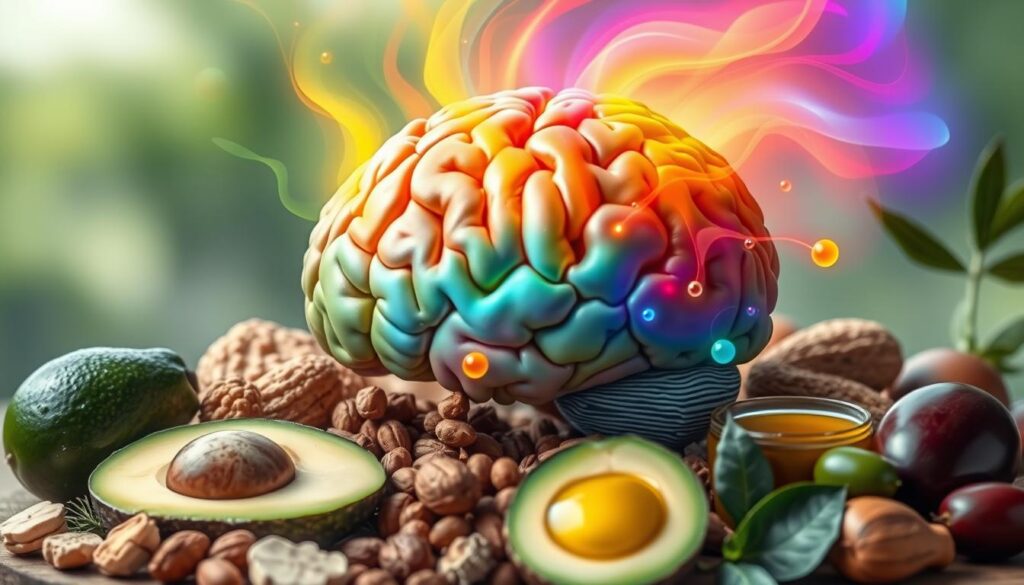
Brain Development and Fat Consumption
Fats are vital for brain growth, especially in babies and young kids. A diet full of healthy fats supports brain cell growth. The right mix of omega-6 and omega-3 fats is important for brain health.
Some foods that are good for the brain include:
- Fatty fish, such as salmon and sardines
- Nuts and seeds, such as walnuts and chia seeds
- Legumes, such as beans and lentils
- Whole grains, such as brown rice and quinoa
Incorporating Healthy Fats into Your Daily Diet
Eating healthy is key to a balanced diet, and incorporating healthy fats is vital. These fats give us energy, help our hearts, and help us absorb vitamins. To add healthy fats to your diet, try cooking with olive oil, eating nuts and seeds, and including fatty fish in your meals.
A diet full of healthy fats can bring many benefits. It can lower inflammation and boost heart health. Some good fats include:
- Omega-3 fatty acids in salmon and walnuts
- Monounsaturated fats in avocados and olive oil
- Polyunsaturated fats in nuts and seeds
By tweaking your daily diet, you can add healthy fats and better your health. Always pick whole foods over processed ones. Also, make sure to eat a balanced diet with a variety of healthy fats.
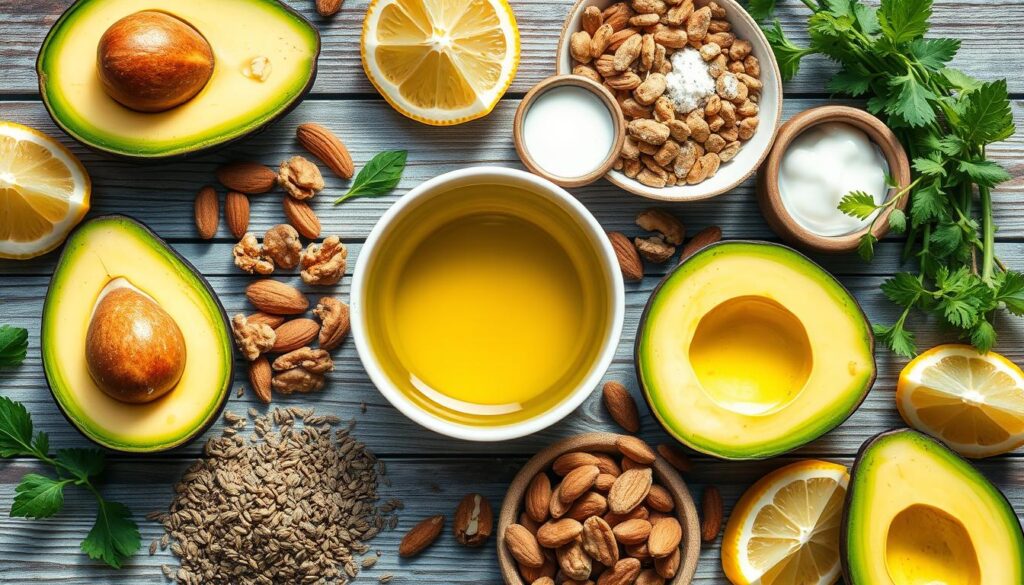
For more tips on healthy eating and adding healthy fats to your diet, talk to a healthcare expert or a registered dietitian.
| Food | Healthy Fat Content |
|---|---|
| Salmon | Omega-3 fatty acids |
| Avocado | Monounsaturated fats |
| Almonds | Polyunsaturated fats |
Common Myths About Dietary Fats Debunked
Dietary fats are often misunderstood. Many myths surround their role in a healthy diet. One common myth is that a low-fat diet is always the best choice. However, this is not entirely true.
While some fats, like trans fats and saturated fats, can be harmful, others are essential. Monounsaturated and polyunsaturated fats are good for our health. They help our heart, brain, and make us feel full.
Choosing a low-fat diet can lead to nutrient deficiencies. It can also make us feel hungry and eat more. On the other hand, healthy fats offer many benefits. They improve heart health and brain function, and help us feel full.
It’s important to know the different types of dietary fats. This knowledge helps us make better diet choices. By understanding the truth about dietary fats, we can improve our health.
- Monounsaturated and polyunsaturated fats, found in foods like nuts, seeds, and avocados, can help lower cholesterol and reduce the risk of heart disease.
- Saturated fats, found in foods like meat and full-fat dairy products, can increase cholesterol and should be consumed in moderation.
- Trans fats, found in processed foods like margarine and fried foods, should be avoided altogether due to their negative impact on heart health.
By understanding the different types of dietary fats and their effects on our bodies, we can make informed choices about our diet and improve our overall health.
| Fat Type | Food Sources | Health Effects |
|---|---|---|
| Monounsaturated | Nuts, seeds, avocados | Lower cholesterol, reduce heart disease risk |
| Polyunsaturated | Fatty fish, flaxseeds, chia seeds | Lower cholesterol, reduce heart disease risk |
| Saturated | Meat, full-fat dairy products | Increase cholesterol, should be consumed in moderation |
| Trans | Processed foods, margarine, fried foods | Negative impact on heart health, should be avoided |
Optimal Daily Intake of Healthy Fats
To keep a balanced diet, knowing how much healthy fat to eat is key. The American Heart Association says 20% to 35% of daily calories should be from healthy fats. Foods like fatty fish, nuts, and avocados are good sources.
It’s important to watch serving sizes to get the right amount of healthy fats. For example, 1 ounce of nuts has about 160 to 180 calories. A 3-oz serving of fresh mackerel has around 11.8 grams of fat. Make sure to eat less than 10% of daily calories from saturated fats.
Recommended Serving Sizes
- Fatty fish: at least 2 servings per week
- Nuts: 1 ounce per serving
- Avocados: 1 medium per serving
By following these guidelines and watching serving sizes, you can get the right amount of healthy fats. This helps support your health and lowers the risk of diseases like heart disease and some cancers.
Signs of Fat Deficiency
A fat deficiency can lead to serious health problems. These include dry skin, hair loss, and poor wound healing. Eating a balanced diet with healthy fats is crucial to avoid these issues. It helps keep you healthy and reduces disease risk.
Shopping Guide for Healthy Fat Sources
Choosing whole, unprocessed foods is key to adding healthy fats to your diet. A good shopping guide helps you make smart choices. Foods like avocados, nuts, and seeds are full of good fats and offer many health benefits.
Studies show that healthy fats can lower bad cholesterol, blood pressure, and heart disease risk. Here are some top sources:
- Avocados: rich in monounsaturated fats
- Nuts and seeds: rich in polyunsaturated fats and omega-3s
- Fatty fish: rich in omega-3s
- Olive oil: rich in monounsaturated fats
When you shop, pick whole, unprocessed foods. Stay away from foods high in saturated and trans fats. Choose foods packed with essential fatty acids. This shopping guide helps you add healthy fats to your meals.
A balanced diet with whole foods gives you all the nutrients you need. By picking healthy fats and using a shopping guide, you’re on your way to a healthier life.
| Food | Healthy Fat Content |
|---|---|
| Avocados | Monounsaturated fats |
| Nuts and seeds | Polyunsaturated fats and omega-3s |
| Fatty fish | Omega-3s |
| Olive oil | Monounsaturated fats |
Conclusion Embracing Healthy Fats for Optimal Wellness
Incorporating healthy fats into your diet is key for wellness. Studies show they help lower heart disease risk and boost brain function. They are vital for overall health.
The Mediterranean diet, full of healthy fats like avocados and olive oil, is great. It lowers bad cholesterol and improves brain function. It even helps you live longer. On the other hand, trans fats increase heart disease and diabetes risk. So, choose healthy fats over trans fats.
By eating a balanced diet with healthy fats, you support your body’s health. It helps regulate metabolism and boosts energy. Remember, a diet rich in lean proteins, complex carbs, and water is essential for lasting wellness.


